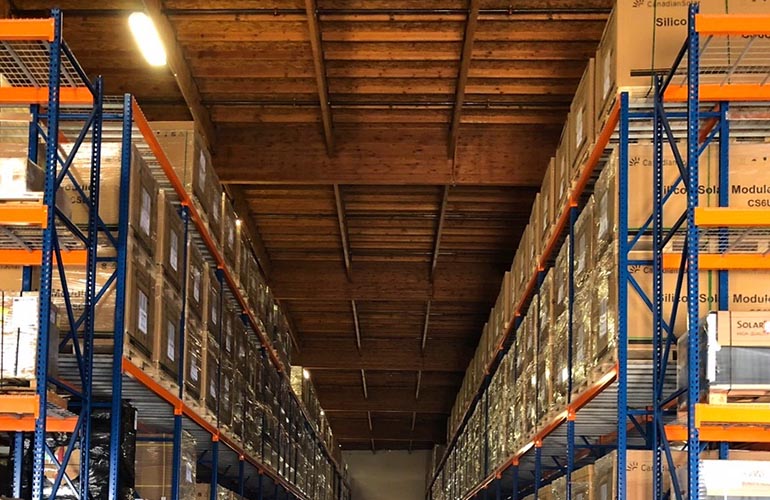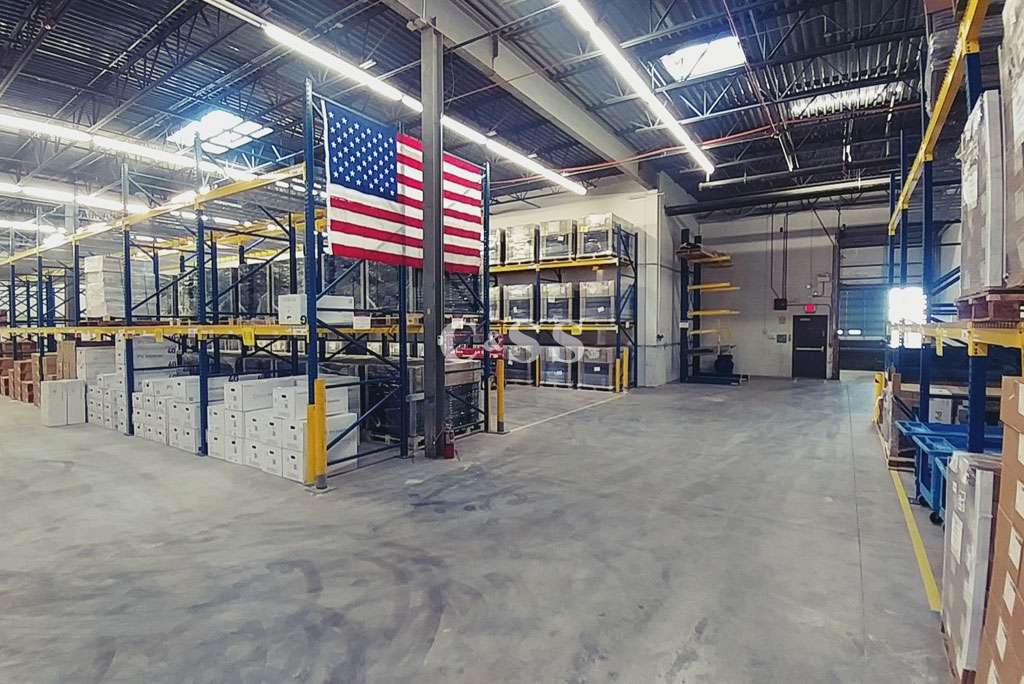Solar panels can be stored in a warehouse by hanging them from the ceiling or mounting them on the walls. The panels should be spaced evenly apart so that they can receive an equal amount of sunlight. If the panels are mounted on the walls, they should be at least four feet off the ground to prevent damage from forklifts or other machinery.
- Find a suitable location for the solar panels inside the warehouse
- The location should be away from any heat sources and have good ventilation
- Clean the solar panels with a soft cloth to remove any dirt or debris
- Place the solar panels on a pallet or other raised platform to keep them off the ground
- Cover the solar panels with a tarp or other protective covering to protect them from dust and other environmental hazards
- Secure the tarp or cover in place with straps or Bungee cords to prevent it from blowing away in windy conditions

Credit: www.solarpowerworldonline.com
Can You Put Solar Panels on a Warehouse?
Yes, solar panels can be installed on a warehouse. However, there are a few things to consider before doing so. The first is the size of the warehouse.
Solar panels need a lot of space to function properly, so a large warehouse will be necessary. The second is the orientation of the warehouse. Solar panels need to face the sun to work correctly, so a south-facing roof will be ideal.
Finally, the climate will also play a role in whether or not solar panels will work well on a warehouse. If the area is prone to cloudy or rainy weather, then solar panels may not be as effective.
How Do You Store Solar Panels When Not in Use?
Solar panels are a great way to save on energy costs, but what do you do with them when they’re not in use? Here are a few options for storing solar panels when they’re not needed:
1. Hang Them on the Wall
One option is to simply hang your solar panels on the wall. This is a great option if you have limited space and don’t want to take up valuable floor space with your panels. Plus, it’s an easy way to keep them out of the way and protected from damage.
2. Store Them in a Shed or Garage
If you have some extra space in your shed or garage, you can store your solar panels there when they’re not in use. Just be sure to keep them away from any chemicals or corrosive materials that could damage them.
Can Solar Panels Be Stacked for Storage?
Most solar panels are made with silicon, which is a non-toxic and abundant element found in sand. Solar panels convert sunlight into electricity by exciting electrons in the silicon and causing them to flow through the material to create an electric current. A solar panel is essentially a large square of silicon that has been cut into thin wafers, coated with metal conductors, and placed behind a layer of glass.
Solar panels can be stacked for storage, but there are some limitations to consider. First, the amount of electricity that can be generated from stacking solar panels will be limited by the number of panels and their efficiency. In addition, stacking solar panels may make it more difficult to access individual panels for maintenance or repairs.
Finally, it is important to ensure that the stack is stable and secure so that it does not pose a safety hazard.
What is the Best Way to Store Solar Power?
Solar power is a clean and renewable energy source that can be used to generate electricity or heat. Solar power can be stored in a number of ways, including:
1. Batteries: Solar batteries are specifically designed to store solar energy.
They work by converting the energy into electrical current, which can then be used to power appliances and devices when needed. Solar batteries are typically made from lead-acid or lithium-ion, and come in a variety of shapes and sizes to suit different needs.
2. Thermal storage: This method involves using solar energy to heat up water or another substance, which can then be stored until it’s needed.
Thermal storage is often used in conjunction with solar heating systems, as it allows the heat to be released gradually over time – making it an efficient way to store solar energy for long periods of time.
3. Pumped hydroelectricity: This storage method uses excess solar electricity to pump water uphill into a reservoir; when the sun isn’t shining, the water is released back down through turbines, generating electricity as it goes. Pumped hydroelectricity is one of the most common methods of storing solar energy on a large scale, and can provide backup power for entire communities during blackouts or other emergencies.
Solar for Cold Storage Warehousing | SunPeak and Central Storage Warehouse Project Overview
How to Transport Solar Panels
Solar panels are a great way to save on energy costs, but they can be delicate and expensive. Here are a few tips on how to properly transport solar panels:
1. Use a soft cloth or padding to protect the surface of the solar panel.
This will help prevent scratches and other damage.
2. Do not stack solar panels on top of each other. This could cause them to break or become damaged.
3. Secure the solar panels in place with straps or tie-downs. This will keep them from moving around during transport and helps to prevent damage.
Solar Panels for Warehouses
Solar panels are an increasingly popular way to power warehouses. They offer a number of advantages over traditional grid-connected systems, including lower energy costs, improved reliability, and greater flexibility.
Solar panels can be used to supplement or replace existing grid-connected power systems.
They can be installed on the roof or ground, and many warehouses have ample space for large solar arrays. In addition, solar panels can generate electricity even during power outages, providing backup power for critical operations.
The initial cost of solar panel installations is often the biggest barrier to adoption.
However, there are many financing options available that can make solar more affordable. In addition, the long-term savings on energy costs typically outweigh the upfront investment.
If you’re considering adding solar panels to your warehouse, it’s important to work with a reputable installer who has experience with commercial projects.
They will help you determine the best location for your array and ensure that it is properly sized for your needs.
Solar Panels for Industrial Units
As the world progresses, more and more businesses are looking for ways to go green. Solar panels are a great way for industrial units to save money and energy. Here are some things to consider when installing solar panels on your industrial unit:
1. The size of your industrial unit will determine how many solar panels you will need. It is important to get an estimate of the square footage that your solar panels will need to cover.
2. The type of roofing material on your industrial unit will also affect the number of solar panels you will need.
If you have a metal roof, you may be able to get by with fewer panels than if you had a shingled roof.
3. The amount of sunlight that your industrial unit gets will also play a role in how many solar panels you will need. If you live in an area with lots of sun, you may be able to get by with fewer panels than if you lived in an area with less sun exposure.
4. The angle at which yourindustrialunit’sroofis pitchedwill also affect thenumberof solarpanelsyou’llneedtosfullycoverit; thesteepertheangle,thefewerpanelsneeded,.
Roof Solar Panels
Solar panels on roofs are becoming more popular as the technology improves and the cost of installation comes down. There are a few things to consider before deciding if roof solar panels are right for your home.
The first thing to consider is the orientation of your roof.
Solar panels work best when they are facing south, so if your roof is oriented in another direction, it may not be ideal for solar panel installation. The second thing to consider is the angle of your roof. Solar panels should be installed at an angle that allows them to capture the most sunlight possible throughout the day.
If your roof is too flat or too steep, it may not be ideal for solar panel installation.
The third thing to consider is whether or not your roof can support the weight of solar panels. Most roofs can support the weight of a few solar panels, but if you have a very large array in mind, you’ll need to make sure that your roof can handle the additional weight.
Finally, you’ll need to make sure that there is enough space on your roof for solar panel installation. If you have a very small rooftop, it might not be able to accommodate all of the solar panels you want to install.
Conclusion
Solar panels are a great way to save on energy costs, but they can be difficult to store. If you have a warehouse, there are a few things you can do to make sure your solar panels are stored properly. First, make sure the warehouse is clean and free of dust and debris.
Second, keep the solar panels out of direct sunlight. Third, use racks or shelves to store the solar panels so they are not touching the ground. By following these tips, you can ensure that your solar panels will be stored safely and securely in your warehouse.



